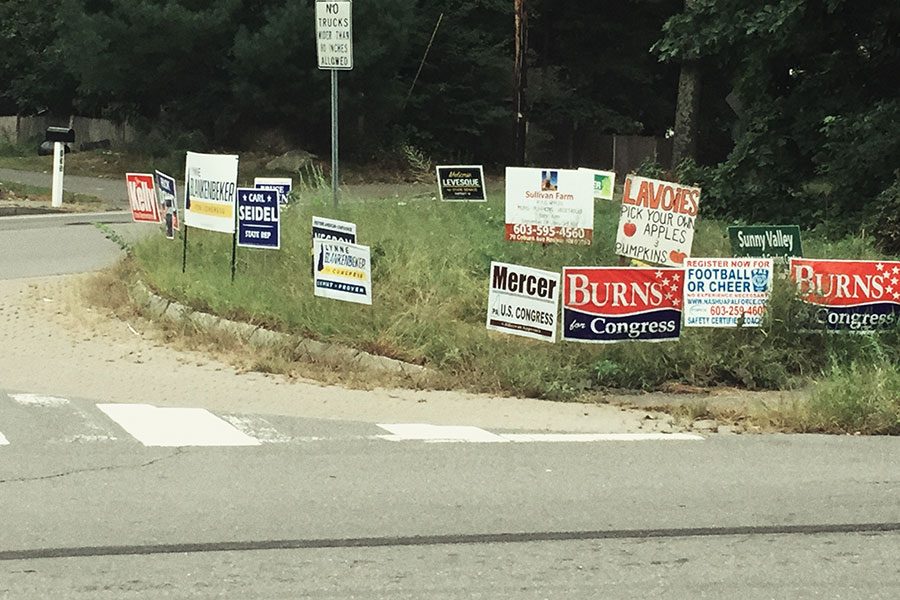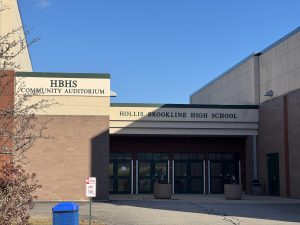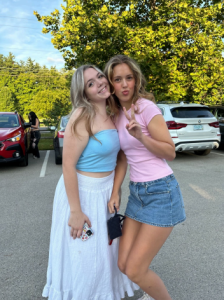Vote early and local
As elections draw near, political signs can be found in abundance on local roadsides. For many voters, this is the closest they will get to name recognition. Only about 20% of people will vote in off year elections.
September 10, 2018
In recent years, buying local produce, artisan goods, and other wares has become extremely popular. Slogans such as “eat local” and “buy local” can be seen on t-shirts, bumper stickers, and tote bags. Despite all this focus on supporting local communities, political emphasis remains national. It’s time for Americans to start voting local as well.
The American presidential election is a huge event. More than a dozen political candidates of differing careers, ideologies, and cultural backgrounds compete for one job. In 2016, 2.4 billion US dollars were spent on the presidential elections alone, which actually represented a small decrease compared to other elections. Media outlets of all sorts focus on the the candidates, and they become a hot topic of conversation across the country. The contest can sometimes veer towards entertainment rather than a democratic process. However, democracy is not confined to this quadrennial event; in fact, the significance of local elections and politicians can be lost in the dramatic battles for seats in Washington.
In a year, only about 1 in 5 Americans will contact a local elected official. This is unfortunate because local politics provide a better way for citizens to influence the governing of their communities. “A lot of people get really excited about voting for president, but local elections can have a more direct impact on your daily life,” said Katherine Henderson, HB social studies teacher. In the past few months, New Hampshire politicians have proved their willingness to discuss issues such as cannabis legalization, the state’s relationship to immigrants, and the possible commuter rail to Boston. Many of these issues could have considerable impacts on New Hampshire and the lives of Granite Staters.
The election of presidents, and to a lesser extent members of Congress, says a lot about the state of the country, and offers a way for citizens to express anger or contentment with the current administration. We must not allow national elections to completely dominate the American political experience. Policies that emerge through state governments can end up as national policies. Before the Supreme Court ruled in favor of gay marriage in the Obergefell v. Hodges case, 12 states and the District of Columbia had legalized the practice in one way or another. Without these states, the LGBTQ+ movement would not have achieved this victory. Similar processes have occurred surrounding issues such as abortion rights, education, and healthcare to name a few. Although a woman’s right to an abortion was affirmed in the famous Roe v. Wade decision, actual access to abortion differs by state based on regulations and the availability of Planned Parenthood. Similarly, state policies define home federal programs for education and healthcare that are utilized by citizens.
Federal policies are important because they set precedent and the way that the US is seen from abroad. Still, these policies are applied to the lives of everyday Americans by the states. This is a lot of power, especially as states are not always required to follow the intention of federal programs.
Traditionally, states’ rights have been an issue championed by conservatives; this can and is changing. As the more liberal states clash with the Trump administration over issues such as immigration, it becomes clear that the states’ role in governing society cannot be underestimated by either side of the aisle.
In a time when people have become increasingly pessimistic about deadlock in Washington, the people must turn to the state for change. In order for this to happen, voters must educate themselves about their communities, and press their governors, mayors, and state legislators to advocate for the same change that they demand of the President. The beauty of state and local systems of government is best described in the words of Supreme Court Justice Louis Brandeis, “It is one of the happy incidents of the federal system that a single courageous state may, if its citizens choose, serve as a laboratory; and try novel social and economic experiments without risk to the rest of the country.”
New Hampshire primaries for governor, state legislators, and representatives going to DC will be held on September 11. Find your local polling place here, and vote!
Caption: As elections draw near, political signs can be found in abundance on local roadsides. For many voters, this is the closest they will get to name recognition. Only about 20% of people will vote in off year elections.















